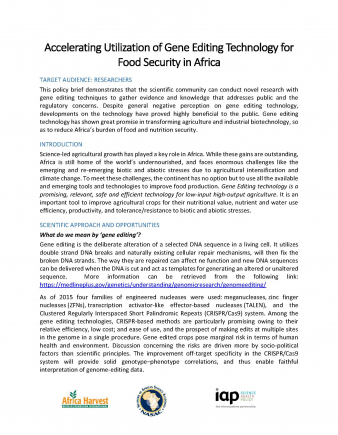This policy brief demonstrates that the scientific community can conduct novel research with gene editing techniques to gather evidence and knowledge that addresses public and the regulatory concerns. Despite general negative perception on gene editing technology, developments on the technology have proved highly beneficial to the public. Gene editing technology has shown great promise in transforming agriculture and industrial biotechnology, so as to reduce Africa’s burden of food and nutrition security.
Science-led agricultural growth has played a key role in Africa. While these gains are outstanding, Africa is still home of the world’s undernourished, and faces enormous challenges like the emerging and re-emerging biotic and abiotic stresses due to agricultural intensification and climate change. To meet these challenges, the continent has no option but to use all the available and emerging tools and technologies to improve food production. Gene Editing technology is a promising, relevant, safe and efficient technology for low-input high-output agriculture. It is an important tool to improve agricultural crops for their nutritional value, nutrient and water use efficiency, productivity, and tolerance/resistance to biotic and abiotic stresses.


